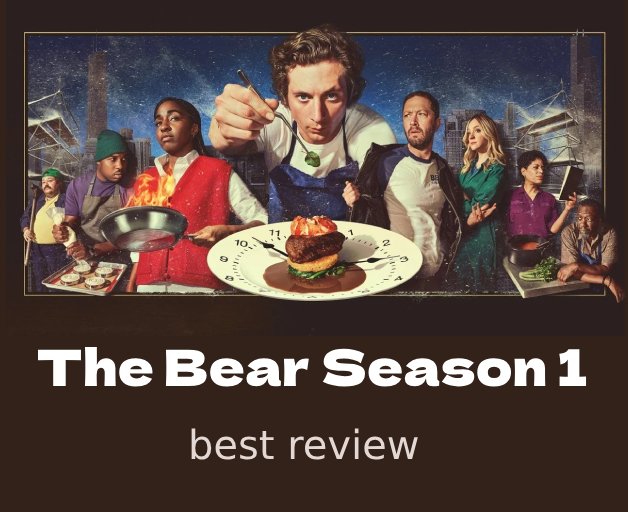Introduction
In this detailed review of The Bear Season 1, we explore every angle: the setting, the characters, the emotional arcs, the culinary authenticity, and the writing and direction that made it one of the most acclaimed series of the year. You will find actor profiles, plot breakdowns, thematic analysis, and why it resonated with audiences everywhere
Setting and Premise
The Bear begins in the chaotic kitchen of Carmy Berzatto, a talented young chef returning to Chicago to take over his late brother’s sandwich shop, “The Original Beef of Chicagoland.” The series introduces a gritty, fast‑paced environment where Carmen (Cameron “Carmy” Berzatto, played by Jeremy Allen White) must rebuild a failing restaurant with no staff, no systems, and everyone expecting a miracle. The tension between high‑end culinary ambition and low‑budget shop life offers a vivid backdrop where class, grief, trauma, and ambition collide.
Main Characters and Actors
- Cameron “Carmy” Berzatto (Jeremy Allen White): A gifted chef who once gained fine‑dining experience in New York with hopes of establishing a three‑Michelin‑star restaurant. Portrayed with intensity and vulnerability, White grounds the show in a deeply human performance.
- Richie Jerimovich (Ebon Moss‑Bachrach): Carmy’s childhood friend and at‑times nemesis, co‑owner of the shop. Torn between loyalty and resentment, Moss‑Bachrach delivers a volatile and unpredictable character.
- Sydney Adamu (Ayo Edebiri): A rising sous chef Carmy hires from New York, bringing professionalism, drive, and calm leadership to the disordered kitchen. Edebiri’s performance is sharp, funny, and grounded in intelligence.
- Marcus Brooks (Lionel Boyce): Line cook and long‑time employee of the beef shop who navigates between Richie’s leadership and Carmy’s high expectations. Boyce adds warmth to intense scenes.
- Tina Marrero (Liza Colón‑Zayas), Neil Fak, Ebraheim (Edwin Lee Gibson) and others: Supporting ensemble who bring authenticity, humor, and emotional resonance.
Story and Episode Highlights
Season 1 unfolds over eight episodes. At first, Carmy and Richie operate in survival mode: no payroll, constant stress, broken equipment. Episode by episode, we feel the pressure rising: health inspections, angry customers, financial collapse. The show devotes substantial time to sequences in the kitchen—fast‑cutting, orders shouted, pots frying—immersing viewers in sensory chaos.
As Carmy and Sydney implement new systems and menu changes, conflict erupts. Richie resists change, longtime staff struggle to adjust, and Carmy grapples with guilt over his brother’s suicide. By mid‑season, the shop transforms: they renovate the kitchen, redesign menus around Carmy’s upscale dishes, and slowly begin to attract customers again. An unforgettable montage sequence shows Carmy constructing his new menu—in camera motion synced to music—symbolizing rebirth and creative focus.
Themes and Emotional Core
This season balances culinary ambition with grief: Carmy’s relentless discipline clashes with Richie’s nostalgia for the old shop. Sydney acts as mediator, pushing everyone forward. Themes of family (chosen and biological), mental health (depression, survivor guilt), and the tension between art and commerce are explored deeply. The show doesn’t rely on typical “reality kitchen” tropes, instead focusing on relationships and emotional stakes under pressure.
Visual and Sound Design
Every shot in the kitchen feels claustrophobic: tight framing, frenetic camera movement, wired tension. The sound design is remarkable: orders shouted, slicers buzzing, sizzle of fat—immersive and exhausting. Music choices enhance rhythm: fast‑paced during service, quiet and minimal in emotional scenes. This aesthetic captures the visceral heat and heartbreak of restaurant work.
Why Season 1 Works
Season 1 succeeds because it combines an authentic depiction of culinary workplace stress with real emotional stakes. It doesn’t glamorize cooking; it shows the bruises, exhaustion, failure, and small triumphs. The cast chemistry elevates every moment—every fight, every breakthrough rings true. Writers Sam and Joanna Reetz, and executive producers Christopher Storer and Ayo Edebiri, deliver character arcs that feel earned and messy. The narrative hooks you by the throat, never letting go until the final, bittersweet payoff.
Full Review Section – Exhaustive, Deep Description
In episode one, Carmy arrives at the decrepit Beef shop: no running water, faulty fryer, missing funds. He finds staff underpaid and demoralized. Richie, resentful of Carmy’s departure and his own financial struggles, alternately mocks and resists him. Tensions blossom immediately. Sydney is introduced mid‑episode; her competence and calm professionalism contrast sharply with Carmy’s high‑pressure style and Richie’s impulsiveness. Over the next few episodes, Carmy and Sydney attempt to bring systems and standards: mise en place, plating, menu structure—Richie and the legacy staff push back, fearing alienation of regular customers. Episode four presents a health inspection crisis, forcing Carmy to handle an emergency while rebuilding trust in Richie.
Carmy’s interior grief emerges in private moments: he compulsively cleans the bloody kitchen floor, replays trauma, flashes back to his brother’s absence. Sydney becomes confidante: they share moments of vulnerability after late-night prep. Meanwhile, Marcus and Neil grapple with the demands of stricter discipline. There’s a pivotal scene in one mid-season episode where Carmy confronts Richie in the walk‑in freezer, both screaming frustrated monologues. It’s cathartic and raw.
By the finale, the team launches a special menu night. Orders flood in; kitchen chaos is choreographed controlled chaos. The final montage shows Carmy plating his signature duck dish, Sydney coordinating service, Marcus plating sides. They sell out. It’s a triumph, but Carmy stands alone afterward: exhausted, shaken, aware this is only just the beginning. The screen fades on a moment of fragile victory.
Conclusion – the bear season 1 best review
Season 1 of The Bear lays a stunning foundation: richly drawn characters, emotional honesty, authentic tension, and cinematic presentation. It earned critical acclaim and an engaged audience because it captures flavor—culinary, emotional, and psychological—in vivid detail. Jeremy Allen White, Ayo Edebiri, and the ensemble deliver astonishing performances grounded in realism. If you care about storytelling, characters, pressure, and raw human connection, Season 1 hits hard and stays with you.
Go to main page


